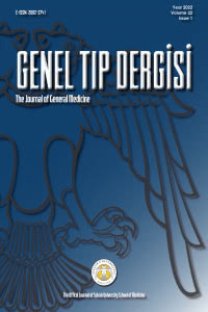Yüksek kolesterollü diyetle beslenen sıçanlarda Foeniculum vulgare P. mill. (rezene) tohumlarının kan kolesterol seviyesi üzerine etkisi
Diyet, Foeniculum, Sıçanlar, Kolesterol
The study of the effects of Foeniculum vulgare P. Mill. (fennel) seeds on the blood cholesterol levels and some other blood paramaters in high cholesterol diet fed rats
Diet, Foeniculum, Rats, Cholesterol,
___
- 1. Baytop T. Therapy with medicinal plants in Turkey. 2nd Edition, İstanbul, Nobel Tıp Kitabevleri, 1999.
- 2. Akgül A. Baharat Bilimi & Teknolojisi. Birinci Baskı, Ankara, Gıda Teknolojisi Derneği Yayınları No: 15, Ankara, 1993.
- 3. Zeybek N. Medical Plants of Turkey (I. The North-Eastern “Pontus” of Anatolia). First Edition, İzmir, Ege Üniversitesi Matbaası, Ege Üniversitesi Tıp Fakültesi Neşriyatı No: 8, 1960.
- 4. Ernst E. The Desktop guide to complementary and alternative medicine. Mosby, Toronto, 2001.
- 5. Özçelikay G, Şar S, Asil E. 1989-1995 yılları arasında Sağlık Bakanlığı tarafından bitkisel ilaçlar için verilen ithal ve üretim ruhsatları üzerine bir çalışma. XI. BİHAT, 22-24 Mayıs 1997 Ankara, Bildiri kitabı. Ed: Coşkun M, Ankara Üniv Ecz Fak Yay No: 75: 482-90.
- 6. Mimica-Dukic N, Kujundzic S, Sokovic M, Couladis M. Essential oil composition and antifungal activity of Foeniculum vulgare Mill. obtained by different distillation conditions. Phytother Res 2003;17:368-71.
- 7. Aridogan BC, Baydar H, Kaya S, Demirci M, Ozbasar D, Mumcu E. Antimicrobial activity and chemical composition of some essential oils. Arch Pharm Res 2002;25:860-4.
- 8. Kim DH, Ahn YJ. Contact and fumigant activities of constituents of Foeniculum vulgare fruit against three coleopteran stored-product insects. Pest Manag Sci 2001;57:301-6.
- 9. El Bardai S, Lyoussi B, Wibo M, Morel N. Pharmacological evidence of hypotensive activity of Marrubium vulgare and Foeniculum vulgare in spontaneously hypertensive rat. Clin Exp Hypertens 2001;23:329-43.
- 10. Ruberto G, Baratta MT, Deans SG, Dorman HJ. Antioxidant and antimicrobial activity of Foeniculum vulgare and Crithmum maritimum essential oils. Planta Med 2000;66:687-93.
- 11. Malini T, Vanithakumari G, Megala N, Anusya S, Devi K, Elango V. Effect of Foeniculum vulgare Mill. seed extract on the genital organs of male and female rats. Indian J Physiol Pharmacol 1985;29:21-6.
- 12. Chakurski I, Matev M, Koichev A, Angelova I, Stefanov G. Treatment of chronic colitis with an herbal combination of Taraxacum officinale, Hipericum perforatum, Melissa officinaliss, Calendula officinalis and Foeniculum vulgare. Vutr Boles 1981;20:51-4.
- 13. Özbek H. Foeniculum vulgare Mill. (rezene) meyvesi uçucu yağının lethal doz 50 (LD50) düzeyi ve sağlıklı ve diyabetli farelerde hipoglisemik etkisinin araştırılması. Van Tıp Derg 2002;9:98-103.
- 14. Özbek H, Uğraş S, Dülger H, Bayram I, Tuncer I, Ozturk G, et al. Hepatoprotective effect of Foeniculum vulgare essential oil. Fitoterapia 2003;74:317-9.
- 15. Özbek, H., Uğraş S, Bayram İ, Uygan İ, Erdoğan E, Öztürk A, et al. Hepatoprotective effect of Foeniculum vulgare essential oil: A carbon-tetrachloride induced liver fibrosis model in rats. Scand J Lab Anim Sci 2004;31:9-17.
- 16. Özbek H, Bayram İ, Cengiz N, Uğraş S. Investigation of hepatoprotective effect of Foeniculum vulgare fixed oil in rats. Res J Med & Med Sci 2006;1:72-6.
- 17.Özbek H, Taş A, Özgökçe F, Selçuk N, Alp Ş, Karagöz S. Evaluation of median lethal dose and analgesic activity of Foeniculum vulgare Miller essential oil. Int J Pharmacol 2006;2:181-3.
- 18.Özbek H, Öztürk M, Öztürk A, Ceylan E, Yener Z. Determination of lethal doses of volatile and fixed oils of several plants. East J Med 2004;9:4-6.
- 19.Pamuk A. Şifalı bitkiler ansiklopedisi. Pamuk Yayıncılık, İstanbul, 1998.
- 20.Kayaalp O. Rasyonel tedavi yönünden tıbbi farmakoloji. onuncu baskı, Hacettepe-TAŞ, Ankara, 2002.
- 21. Lee WC, Chao WT, Yang VC. Effects of high-cholesterol diet on the interendothelial clefts and the associated junctional complexes in rat aorta. Atherosclerosis 2001;155: 307-12.
- 22. Eddy AA, Liu E, McCulloch L. Interstitial inflammation and fibrosis in rats with diet-induced hypercholesterolemia. Kidney Int 1996;50:1139-49.
- 23.Yadav SP, Vats V, Ammini AC, Grover JK. Brassica juncea (Rai) significantly prevented the development of insulin resistance in rats fed fructose-enriched diet. J Ethnopharmacol 2004;93:113-6.
- 24. Sümbüloğlu K, Sümbüloğlu V. Biyoistatistik, 10. baskı, Ankara, Hatiboğlu Yayınevi, 2002.
- 25. İmren AH, Turan O. Klinik tanıda laboratuar. Beta Yayım Dağıtım AŞ., 3. baskı, İstanbul, 1985.
- 26. Deepa PR, Varalakshmi P. Protective effects of certoparin sodium, a low molecular weight heparin derivative, in experimental atherosclerosis. Clin Chim Acta 2004;339:105-15.
- 27. Özbek, H. The anti-inflammatory activity of the Foeniculum vulgare L. essential oil and investigation of its median lethal dose in rats and mice. Int J Pharmacol 2005;1:329-31.
- ISSN: 2602-3741
- Yayın Aralığı: 6
- Başlangıç: 1997
- Yayıncı: SELÇUK ÜNİVERSİTESİ > TIP FAKÜLTESİ
Ağrılı lomber vertebra çökme kırığı ve lumbosakral spondilolistezisi olan bir vakada tedavi
Fuat TORUN, Erdal KALKAN, Onur ÇİÇEK, MEHMET FATİH ERDİ
Fibula proksimalinde stres kırığı: Olgu sunumu
M. Nazım KARALEZLİ, Hatice TOY, HÜSEYİN YUSUF YILDIZ, Serhat YILDIRIM
Mustafa Alparslan BABAYİĞİT, Recai OĞUR, Ömer Faruk TEKBAŞ, METİN HASDE
İntihar sonucu meydana gelen ölümlerin incelenmesi
Yücel YAVUZ, YUSUF YÜRÜMEZ, HÜDAVERDİ KÜÇÜKER, Reha DEMİREL, Egemen KÜÇÜK
Çocuklarda mivakuryum ve rokuronyumun nöromusküler blok ve entübasyon koşullarına etkisi
Seza APİLİOĞULLARI, Selmin ÖKESLİ, Ruhiye REİSLİ, ATEŞ DUMAN, Öztin Cemile ÖĞÜN
HANEFİ ÖZBEK, Nureddin CENGİZ, AYDIN HİM, Serdar UĞRAŞ, FEVZİ ÖZGÖKÇE, ENDER ERDOĞAN
Sevgi KELEŞ, HALUK YAVUZ, Said BODUR
Mauriac sendromu: Bir olgu sunumu
Erdal TAŞKIN, MEHMET KILIÇ, Mustafa AYDIN, SABAHATTİN ERTUĞRUL, Abdullah Denizmen AYGÜN
